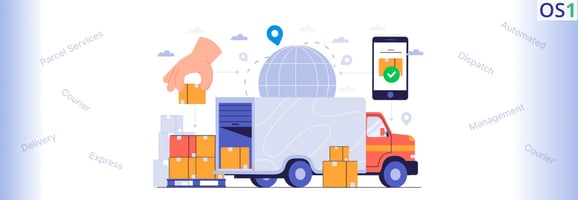In the fast-paced world of logistics, efficiency and optimization greatly affect profitability and...
Everything you need to know about Dispatch Management
In the past few years, enterprises have started moving away from siloed logistics operations management and are increasingly shifting towards a holistic approach.
.jpg?width=3500&height=2336&name=still-life-supply-chain-representation1).jpg)
The desire for quick and transparent deliveries has emerged as a central focus for businesses striving to gain a strategic foothold in the competitive market. This is where technology comes into play.
The right set of technologies helps automate delivery assignments to the most-suited drivers , while capitalizing on booming order volumes. Before diving deep into technology's role in managing and optimizing delivery operations, let us understand what dispatch management looks like.
What is Dispatch Management?
Dispatch management is a process through which delivery operators efficiently manage, allocate, and optimize the entire order-captured to order-delivered cycle. The multistep process includes different stages where stakeholders collaborate and orchestrate a seamless fulfillment experience. Dispatch management enables logistic operators to:
- Convert complex dispatch processes into simpler and convenient dispatch plans
- Capture, sequence, and allocate orders based on time and route preferences
- Automate ideal route plan generation to accommodate promised SLAs
- Resolve delivery disruptions with proactive responses
- Make informed and data-backed future decisions
And many more.
Also read: Streamline Your Operations with Powerful Dispatch Software
Comparing Logistic Operations With & Without Dispatch Management Software
Ever wondered what happens when an order is placed? How is a route or delivery driver chosen for a particular order? What decisions are made before moving the order to the delivery stage? All these are critical aspects of a delivery process and hold a significant value in impacting overall performance of logistics operations.
Businesses adopting dispatch management have seen a remarkable improvement in the optimization and performance of their delivery operations. Here is a comparative analysis of how logistic processes work with and without dispatch management.
|
Logistic Operations |
Without Dispatch Management |
With Dispatch Management |
|
Capturing Orders |
Dispatcher has to continuously monitor different windows to ensure orders coming from multiple sources are accommodated on time |
Dispatchers can get a consolidated view of incoming orders from multiple channels |
|
Order Dispatch Plan |
Manual creation of a dispatch plan leads to a longer delivery cycle due to delays in creating and assigning tasks |
Quick automated plans lead to shorter turnaround delivery times |
|
Route Selection |
Delivery routes are planned based on tribal knowledge and address information shared by customers. |
Delivery routes are planned automatically considering route conditions, traffic peak hours, and route restrictions.
|
|
Assigning Task to Drivers |
Tasks are assigned with simple scheduling principles, such as the round-robin process, irrespective of the current location of the driver |
Tasks are assigned to the most-suited driver based on his real-time location, vehicle capacity, and availability |
|
Order Delivered |
Dispatchers have to track order delivery status and maintain notes to avoid future discrepancies |
Digital PODs are shared with involved stakeholders to acknowledge delivery completion |
Impact of Effective Dispatch Management
Leveraging dispatch management can enable businesses to achieve operational excellence and maximize resource efficiency. According to a recent Gartner study, businesses are increasingly earmarking 73% of their total budget towards enhancing the growth and performance of their operations.

Different elements of the dispatch management enable stakeholders to improve delivery operations by managing and optimizing the fulfillment cycle. Here is how all of these elements contribute to making dispatch management seamless and efficient.
Order capturing & Processing
Businesses can enhance their order collection and batching processes by incorporating a consolidated dashboard, providing them with a unified view of all captured orders.
Route Plan Generation
Dispatchers can seamlessly generate routes to accommodate all scheduled deliveries using predefined delivery parameters and route algorithms.
Vehicle & Resource Selection
Dispatch management automates delivery orchestration by auto-allocation of vehicle and drivers based on associated shipping costs, SLAs,and other constraints.
Tracking & Visibility of on-ground events
End-to-end tracking of in-transit orders allows relevant stakeholders to proactively respond to delivery disruptions and reduce chances of unplanned delays.
Collecting Data & insights
Businesses can drive better decisions by getting valuable and timely insights for key metrics such as task density against time, time taken to complete per order, SLA adherence rate, etc.
Conclusion
Dispatch management capabilities enable businesses to automate their logistic processes and open doors for scalability. The proficiency in handling and optimizing delivery operations enhances productivity not only for dispatchers but for the fulfillment cycle, at large.
As logistic operations continue to become more complex, dispatch management will gain vitality. At DispatchOne, the concept of dispatch management aligns with the modernization of logistics operations through automated order to delivery plan, real-time data visualization ,end-to-end visibility of on-ground operations and proactive handling of delivery hiccups. The solution also helps businesses create exceptional delivery experiences for consumers and provides drivers with the technological additions ( end-to-end navigation, POD) they need to perform at their best.
Want to get started with an efficient and scalable dispatch management solution? Book a consultation with us!


%20(2).jpg?height=200&name=supply-chain-representation-still-life%20(1)%20(2).jpg)